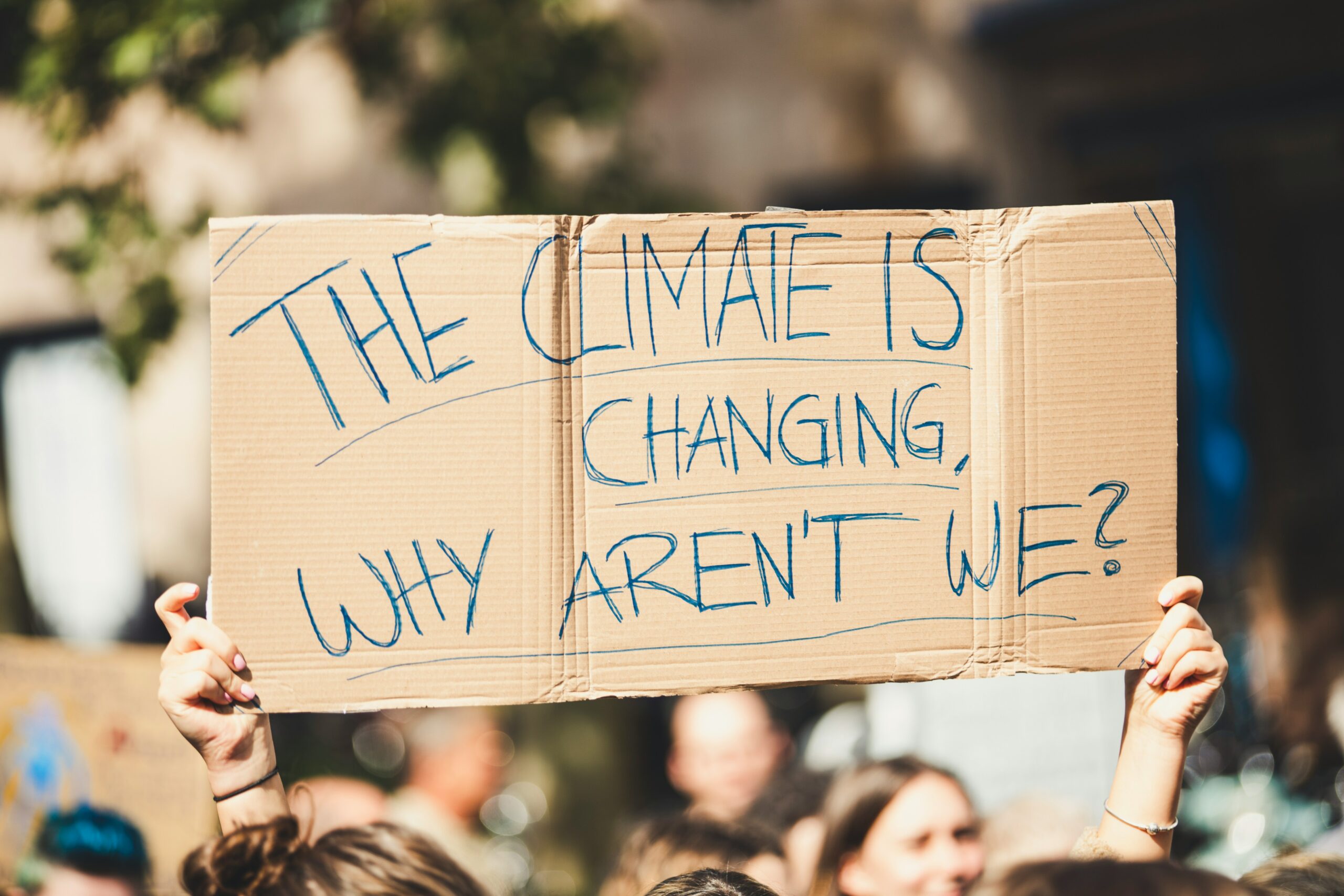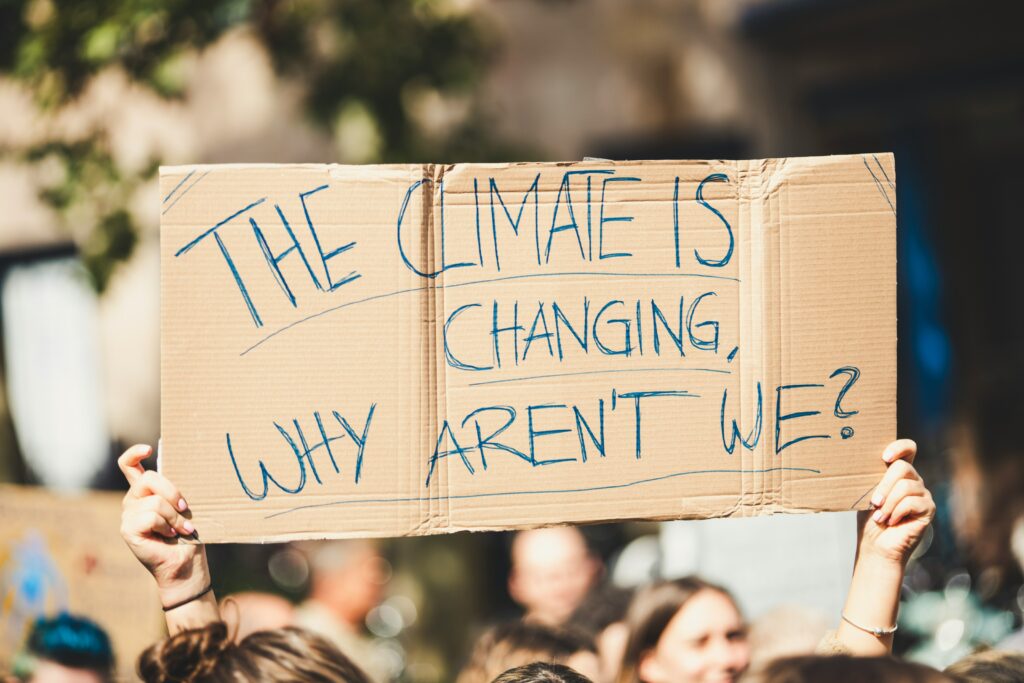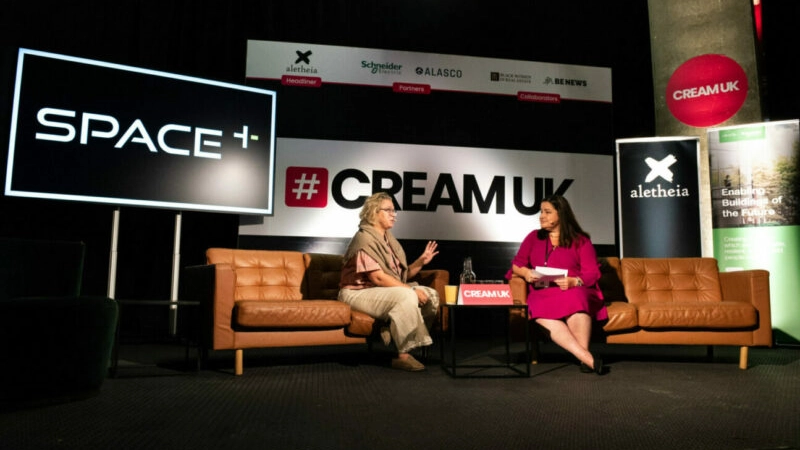We talk a lot to Heads of ESG (owner and occupiers) and frequently hear; Why are they not getting it? Why are the only unifying narratives about carbon or disclosure reporting? Why is the purpose of this missing?
We know that buildings, infrastructure, and places account for nearly 40% of global emissions. But if the human systems around them don’t change, the potential of even the most sustainable assets will never be realised.
So, how do we get people to get it?
A Crisis Not of Knowledge, But of Perception
The barriers to climate action aren’t just physical or financial—they’re emotional, psychological, and cultural.
Climate change has become a proxy war for identity. It’s deeply political, tangled in narratives of fairness, blame, and personal freedom. Public discourse is shaped by reductive stereotypes – “privileged activists”, “climate deniers”- that reinforce division and inhibit dialogue.
Even well-crafted messaging often misses the mark. The iconic imagery of melting ice caps and polar bears feels remote or elitist. Apocalyptic narratives, while factually grounded, create paralysis rather than urgency.
These framings matter. They shape not only how we talk about climate change, but how people relate to it—whether they see themselves in the story, or outside it.
The Tangled Psychology of Inaction
We cannot expect linear, reasoned behaviour in the face of something as complex and slow-moving as climate change.
There are several key cognitive and emotional traps:
Perhaps most revealing is the perception gap: we overestimate our own contribution and underestimate others. The result is a lack of trust, momentum, and collective will—especially in the very places where cooperation is most essential.
The Paradox of the Common Good
The idea of acting for the common good is intuitive—but also deeply countercultural in many societies. We are evolutionarily wired for individual survival. Collective prevention demands effort, cost, and sacrifice—often for benefits that are abstract, distant, or generational.
So we delay. We downplay. We deflect.
Yet, the desire is there. According to a recent global study of 130,000 people across 125 countries:
The public mood has shifted. The real challenge is not convincing people if change is needed—but helping them to act, together, in ways that feel doable, meaningful, and aligned with their identity.
Breaking Through: Five Levers That Work
I propose that there are five key tools to break the stalemate and shift people from knowing to doing. At Aletheia, we see these not only as behavioural science insights—but as practical tools to activate places, assets, and communities.
Humans are social creatures. What we do, buy, tolerate and aspire to is governed more by social norms than by reason. Institutions behave similarly — most are deeply risk-averse and conditioned by precedent.
To change behaviour, we must first change perceptions of what’s “normal”. That means making climate-positive choices visible, social, and routine. It’s not just about telling people what to do—but showing them that others like them are already doing it.
In place terms, that means designing visible signals: community gardens, e-bike hubs, green leases, local sharing economies, transparent sustainability dashboards. Make the sustainable choice the socially obvious one.
We listen differently when the message comes from someone we trust—especially from within our own peer group, professional network or community. Authenticity trumps expertise. Storytelling beats data.
For landlords, developers, and local authorities, this means co-creating campaigns with tenants, local leaders, schools, artists, faith groups—anyone who already holds trust. Don’t broadcast from the top down. Communicate from the inside out.
People need more than motivation—they need permission. Agency is about feeling empowered to act: knowing what to do, having the means to do it, and sensing that the time is right.
In many organisations, people feel more climate agency at home than at work. That’s a failure of leadership, culture and systems design. Empowering teams—across property management, planning, operations—with the right tools, support and visibility is essential.
Information alone rarely changes behaviour. Stories do. Emotion, narrative and personal resonance create the conditions for empathy and imagination. It’s not about fiction—it’s about framing.
Place-based storytelling, rooted in lived experience and shared values, helps people connect climate action to their real lives. Whether you’re rebranding a retail park or regenerating a high street—storytelling humanises the transition.
Sustainable change isn’t a broadcast—it’s a dialogue. Deep engagement doesn’t have to be expensive or time-consuming. Ten minutes of meaningful exchange, repeated consistently, builds trust, shifts mindsets, and unlocks new coalitions.
Engagement should be ongoing, embedded and reciprocal. Not consultation, but collaboration. Not tick-box, but transformation.
What This Means for Real Estate
For those working across the real estate lifecycle, the message is clear: places are people-powered. Without cultural, social and behavioural change, net zero ambitions will stall.
Aletheia’s work focuses on place-led strategy precisely because places hold the keys to visible, shared, meaningful change. They are where behaviour becomes collective; where agency is made public; where identity, economy and climate intersect.
When we align social norms, local trust, visible action and compelling storytelling, we not only support climate goals—we build more valuable, more resilient, and more loved assets.
Final Thought
Climate change is not a failure of awareness. It’s a failure of connection.
As place-makers, asset managers, and advisors, our job is to rebuild those connections—between intention and action, between people and place, between the future we fear and the future we can still create.
We already know what needs to happen. Now we must make it feel possible, shared, and real.
Further Reading:

Name: Aletheia Real Estate Ltd
Address: 71-75 Shelton Street, London, WC2H 9JQ
E-mail: info@youraletheia.com
We currently collect and process the following information:
• Personal identifiers, contacts and characteristics (for example, name and contact details)
Most of the personal information we process is provided to us directly by you for one of the following reasons:
• Request for further information
• Request for meeting
• Entering competition
We use the information that you have given us in order to provide you with a good service and get back in touch with you.
We may share this information within our team only.
Under the UK General Data Protection Regulation (UK GDPR), the lawful bases we rely on for processing this information are:
(a) Your consent. You are able to remove your consent at any time. You can do this by contacting info@youraletheia.com
(b) We have a contractual obligation.
(c) We have a legal obligation.
(d) We have a vital interest.
(e) We need it to perform a public task.
(f) We have a legitimate interest.
Your information is securely stored.
We keep email addresses for as long as we are communicating with you. We will then dispose your information by deleting your email address from any database it is stored within.
Under data protection law, you have rights including:
Your right of access – You have the right to ask us for copies of your personal information.
Your right to rectification – You have the right to ask us to rectify personal information you think is inaccurate. You also have the right to ask us to complete information you think is incomplete.
Your right to erasure – You have the right to ask us to erase your personal information in certain circumstances.
Your right to restriction of processing – You have the right to ask us to restrict the processing of your personal information in certain circumstances.
Your right to object to processing – You have the the right to object to the processing of your personal information in certain circumstances.
Your right to data portability – You have the right to ask that we transfer the personal information you gave us to another organisation, or to you, in certain circumstances.
You are not required to pay any charge for exercising your rights. If you make a request, we have one month to respond to you.
Please contact us at info@youraletheia.com if you wish to make a request.
If you have any concerns about our use of your personal information, you can make a complaint to us at info@youraletheia.com.
You can also complain to the ICO if you are unhappy with how we have used your data.
The ICO’s address:
Information Commissioner’s Office
Wycliffe House
Water Lane
Wilmslow
Cheshire
SK9 5AF
Helpline number: 0303 123 1113
ICO website: https://www.ico.org.uk
Contact us today to discover how engagement can improve your place’s unique relevance and competitive place advantage by emailing us on info@youraletheia.com
Name: Aletheia Real Estate Ltd
Address: 71-75 Shelton Street, London, WC2H 9JQ
E-mail: info@youraletheia.com
We currently collect and process the following information:
• Personal identifiers, contacts and characteristics (for example, name and contact details)
Most of the personal information we process is provided to us directly by you for one of the following reasons:
• Request for further information
• Request for meeting
• Entering competition
We use the information that you have given us in order to provide you with a good service and get back in touch with you.
We may share this information within our team only.
Under the UK General Data Protection Regulation (UK GDPR), the lawful bases we rely on for processing this information are:
(a) Your consent. You are able to remove your consent at any time. You can do this by contacting info@youraletheia.com
(b) We have a contractual obligation.
(c) We have a legal obligation.
(d) We have a vital interest.
(e) We need it to perform a public task.
(f) We have a legitimate interest.
Your information is securely stored.
We keep email addresses for as long as we are communicating with you. We will then dispose your information by deleting your email address from any database it is stored within.
Under data protection law, you have rights including:
Your right of access – You have the right to ask us for copies of your personal information.
Your right to rectification – You have the right to ask us to rectify personal information you think is inaccurate. You also have the right to ask us to complete information you think is incomplete.
Your right to erasure – You have the right to ask us to erase your personal information in certain circumstances.
Your right to restriction of processing – You have the right to ask us to restrict the processing of your personal information in certain circumstances.
Your right to object to processing – You have the the right to object to the processing of your personal information in certain circumstances.
Your right to data portability – You have the right to ask that we transfer the personal information you gave us to another organisation, or to you, in certain circumstances.
You are not required to pay any charge for exercising your rights. If you make a request, we have one month to respond to you.
Please contact us at info@youraletheia.com if you wish to make a request.
If you have any concerns about our use of your personal information, you can make a complaint to us at info@youraletheia.com.
You can also complain to the ICO if you are unhappy with how we have used your data.
The ICO’s address:
Information Commissioner’s Office
Wycliffe House
Water Lane
Wilmslow
Cheshire
SK9 5AF
Helpline number: 0303 123 1113
ICO website: https://www.ico.org.uk
Contact us today to discover how engagement can improve your place’s unique relevance and competitive place advantage by emailing us on info@youraletheia.com
 Navigating Emergence In The Built Environment
November 26, 2025
Navigating Emergence In The Built Environment
November 26, 2025
Disruption of real estate has long been spoken of and from whatever point you participate in this industry, we are all seeing signs where this is now fast becoming reality. As we all begin the frenetic last dash towards the upcoming Festive break, I wanted to write why the position we are in today feels very different to what has gone before
Read more Why Aren’t They Getting It? Reframing Behavioural Responses to Climate Change
August 3, 2025
Why Aren’t They Getting It? Reframing Behavioural Responses to Climate Change
August 3, 2025
We talk a lot to Heads of ESG (owner and occupiers) and frequently hear 'Why aren't they getting it? Why are the only unifying narratives about carbon or disclosure reporting? Why is the purpose of this missing?
Read more With Truth Comes Great Responsibility
July 25, 2025
With Truth Comes Great Responsibility
July 25, 2025
Consultancy has many connotations, not all of them positive. There are those who are stellar and harnessed by companies seeking thought leadership or brand association. There are those for whom consultancy is a willing pair of hands for that specialist, business critical project, or transformation programme. The third category is where we find most of our consultancy assignments, and it’s working to find lasting fixes to deep-seated problems.
Read more The Rise of the Generalist: Why the Future Asset Manager Speaks More Than Just Numbers
June 30, 2025
The Rise of the Generalist: Why the Future Asset Manager Speaks More Than Just Numbers
June 30, 2025
For years, asset managers in real estate were celebrated for their technical fluency—financial modeling, lease structures, ROI performance. It was about precision, data, and measurable returns.
Read more